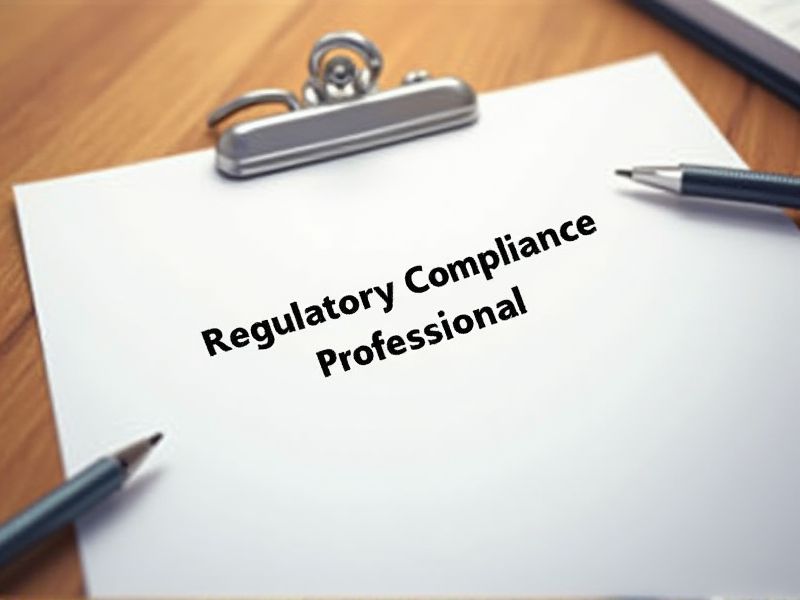
Regulatory compliance professionals ensure that organizations adhere to laws, regulations, and guidelines, which in turn mitigates legal risks and enhances operational efficiency. The intricate and evolving landscape of compliance demands nuanced understanding and up-to-date knowledge. Certifications provide validation of expertise and a standardized measure of competence, essential for maintaining trust with stakeholders. Here are some key certifications that are crucial for a Regulatory Compliance Professional.
Certified Regulatory Compliance Manager (CRCM)
The CRCM credential validates a regulatory compliance professional's expertise in navigating complex financial regulations. Holding this certification often enhances trust from employers and clients, signaling a commitment to upholding legal and industry standards. As financial regulations grow in complexity, a CRCM-certified individual is better equipped to identify and mitigate compliance risks effectively. The certification may lead to career advancement opportunities due to the specialized knowledge and credibility it provides in the compliance field.
Certified Compliance & Ethics Professional (CCEP)
The Certified Compliance & Ethics Professional (CCEP) designation equips professionals with in-depth knowledge of laws, regulations, and ethical standards, essential for ensuring organizational adherence to compliance mandates. Holding a CCEP certification demonstrates a commitment to ethical practices, building trust with stakeholders and reducing legal risks for organizations. Regulatory compliance professionals with this certification tend to have a structured approach to identifying, assessing, and mitigating potential compliance issues. In turn, organizations benefit from more effective compliance programs and improved reputation by relying on certified professionals.
Certified in Healthcare Compliance (CHC)
Becoming Certified in Healthcare Compliance (CHC) equips regulatory compliance professionals with comprehensive knowledge of healthcare laws and regulations. This certification enhances credibility, indicating a commitment to ethical practices and continuous learning. In turn, professionals with a CHC certification are better prepared to identify and mitigate compliance risks within healthcare organizations. Consequently, this reduces the likelihood of legal penalties and fosters an environment of trust and accountability.
Certified Anti-Money Laundering Specialist (CAMS)
Having a Certified Anti-Money Laundering Specialist (CAMS) ensures compliance professionals are well-versed in the latest regulations and practices to detect and prevent money laundering. The CAMS designation equips individuals with the skills to identify suspicious transactions, which is crucial for adhering to legal and regulatory requirements. Regulatory agencies increasingly demand rigorous anti-money laundering protocols, and CAMS-certified professionals can implement effective measures to avoid hefty penalties. An organization with CAMS-certified staff boosts its credibility, fostering trust with clients and regulatory bodies.
Certified Fraud Examiner (CFE)
A Certified Fraud Examiner (CFE) aids Regulatory Compliance Professionals in identifying vulnerabilities in financial systems that may lead to fraudulent activities. By understanding the subtleties of fraud prevention, CFEs enhance compliance frameworks to meet rigorous legal standards. The expertise of a CFE ensures that compliance practices align with the latest legal and ethical requirements, reducing potential regulatory penalties. Employing CFEs also increases trust and credibility with stakeholders who prioritize transparency and integrity in business operations.
Certified Risk and Compliance Management Professional (CRCMP)
Certified Risk and Compliance Management Professional (CRCMP) enhances credibility by validating expertise in navigating complex regulatory environments, which is crucial for regulatory compliance professionals. CRCMP equips professionals with an understanding of international risk frameworks, increasing their ability to manage diverse compliance demands effectively. Possessing CRCMP certification often leads to improved organizational risk management capabilities, reducing potential legal and financial penalties. CRCMP certification provides continuous updates on regulatory changes, enabling professionals to stay ahead in the evolving compliance landscape.
Certified Governance, Risk, and Compliance Professional (CGRCP)
Organizations face increasing regulatory demands. Regulatory Compliance Professionals benefit from CGRCP as it provides them with structured methodologies and enhanced knowledge in governance, risk, and compliance. Possession of this certification leads to improved risk management strategies and more efficient compliance processes. Certified professionals tend to make fewer errors, thereby reducing legal and financial risks for their organizations.
Certified Information Privacy Professional (CIPP)
Data protection laws and regulations are evolving rapidly, requiring organizations to stay current and compliant. A Certified Information Privacy Professional (CIPP) provides the expertise to navigate complex privacy regulations effectively. With specialized knowledge, CIPP professionals help organizations minimize risks and avoid costly penalties. Employers value CIPP certification because it indicates a comprehensive understanding of global privacy frameworks and regulatory standards.
Certified Information Systems Auditor (CISA)
A Certified Information Systems Auditor (CISA) ensures that regulatory compliance professionals maintain and enforce security standards, which audits demand. Regulatory compliance requires clear oversight of information systems, and CISA certification validates an individual's expertise in this area. A professional with CISA certification enhances an organization's ability to meet complex regulatory requirements by identifying and mitigating risks effectively. The presence of a CISA-certified individual builds trust with stakeholders, as it signals a commitment to upholding regulatory compliance within the organization.
ISO 37301 Lead Implementer
ISO 37301 Lead Implementer equips regulatory compliance professionals with a robust framework for implementing effective compliance management systems, reducing risks of non-compliance. As organizations face increasing regulatory scrutiny, expertise in ISO 37301 ensures adherence to legal and ethical standards, safeguarding organizational reputation. Mastery of ISO 37301 enhances a professional's ability to assess and improve compliance processes systematically, promoting efficiency. Continuous advancements in compliance regulations necessitate trained experts to interpret and align corporate policies with evolving standards, which ISO 37301 training provides.
Summary
You, as a Regulatory Compliance Professional, can anticipate enhanced credibility in your role after earning certifications. These certifications often result in expanded career opportunities and increased earning potential. Organizations are likely to perceive you as more knowledgeable and skilled, leading to greater trust in your expertise. Your ability to navigate complex regulatory environments is likely to improve, benefiting both your career and the organization.
